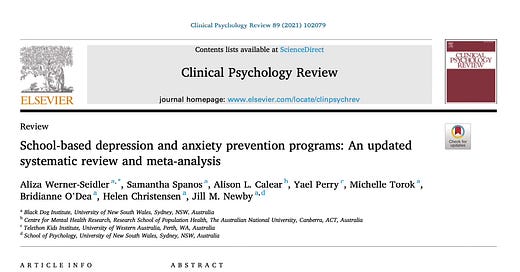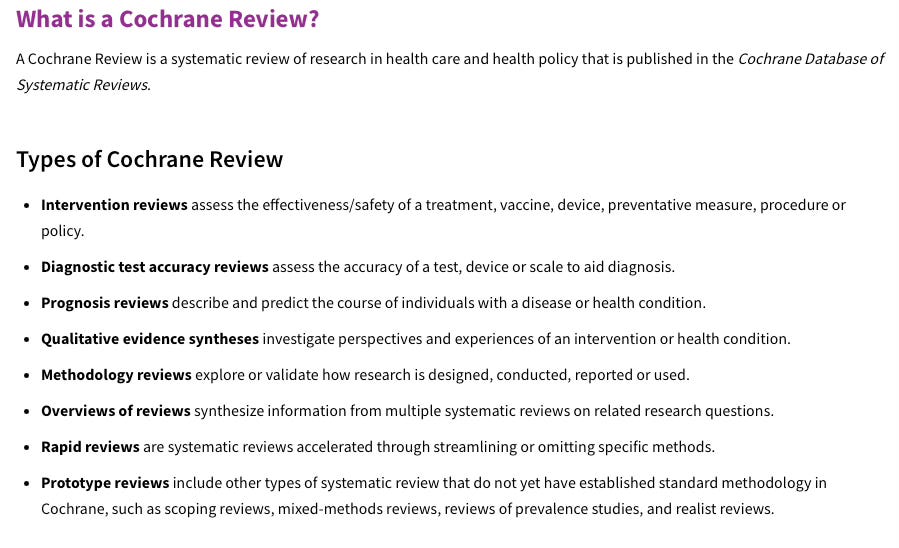🚨Australian Researchers: Most All US Studies on Efficacy of School-Based Mental Health Services are Unreliable Bunk
Risk of bias analysis shows high probability of manipulated studies being used to advance school counseling programs.
In this Stack:
Australian researchers audit studies from around the world on the efficacy of school-based mental health programs
Inadvertently find that almost all American research in this area is unreliable for bias
As much as 93% of American studies - used to make policies in schools across the country and treat your children - are just bunk, mate
This stuff matters
In 2015, and again in 2021, a team of Australian researchers from the School of Psychology at the University of New South Wales, the National Institute for Mental Health Research, and other institutions, undertook a global, comprehensive systematic review and meta-analysis of research literature examining K-12 school-based counseling intervention programs related to student depression and anxiety.
In total, the Australians put under the microscope 211 English-language, peer-reviewed, randomized control studies involving approximately 47,800 students around the world. 58 of those studies were published in the U.S. involving American school-based behavioral health programs.
These Aussies didn’t just compile a survey of studies; they essentially audited all randomized control studies on school-based mental health programs purporting to treat depression and anxiety. And they applied, as ethical meta-analysis researchers do, the international gold standard of risk-of-bias tools to specifically assess the quality of health care research and claims: the Cochrane Review.
You can read about Cochrane Reviews in the link above, but in a nutshell, the Cochrane Review establishes standardized methodologies developed specifically to evaluate the quality of research used to inform public healthcare policies. Niche, I know. But necessary and important - healthcare decisions should be based on good science, right?
So what did they find about the quality of the 58 U.S. based studies using the Cochrane Review? To be fair, they didn’t single-out US research, or even pass comment on it. I had to extrapolate this finding from the data included with each of the 2015 and 2021 reports, transparently identified in a Table of programs evaluated. This allowed me to determine:
In the 2015 systematic review, only 2 out of 27 US-based studies rated "high quality" under the Cochrane Review, leaving a staggering low quality percentage of 92.6%. And only 1 out of the 27 US-based studies at the time could be determined NOT to be selectively reporting data (i.e., containing bias).
In 2021 when they looked again, 84% of the 31 studies were deemed low quality, indicating unreliability and bias, and *zero* of those could be definitively determined NOT to be selectively reporting data.
Both studies found only “very small effects” for actually improving depressive symptoms or anxiety - not just in the U.S., but worldwide.
“Specifically, there are genuine but modest preventive effects of psychological programs delivered at school for depression and anxiety, and the size of the effects dissipate over time.”
Also to be fair, its not just the U.S studies that are bad:
“Fewer than one-third of all studies [worldwide] were judged as high quality, meaning that most studies involved concerning degrees of risk of bias with significant room for improvement.”
These findings are tremendously important for anyone seriously concerned with the increasing emphasis in U.S. schools on mental health, so-called “social emotional” learning, and the wholesale substitution of traditional disciplinary policies with fuzzy, non-disciplinary policies with silly names like “social justice” and “equity” that a generation ago would be a slogan on a Che Gevara T-shirt, not sprinkled throughout the policy book of U.S schools. Yet the new vocabulary of public education is thoroughly infused with these terms. And administrators actually believe in them.
These things didn’t just appear out of the ether. Professional educators, as a class, being the type of people that won’t express an opinion on a ham sandwich until they’ve read a study validating it, have convinced themselves that schools are not just for the ABCs, but must go beyond boring, run-of-the-mill core academic subjects into comprehensive, mental health services. Whole “frameworks” of these things are everywhere in schools (whatever that is).
They have study after study telling them this is true and necessary - and life saving. Even if your local administrator can’t rattle-off academic citations like school children used to memorize great poetry, a good many others can and do. At conferences, in training seminars, in education schools, it is in the air they breathe and water they drink. They then use this research to scare legislatures and governing boards to push a massive, historically unprecedented transformation of U.S. schools into something more akin to health clinics with a classroom attached.
“Here’s your math assignment, don’t forget your counseling session later today. I mean, *wink*…your student support meeting.”
But are those studies, the body of research going back decades now, any good?
Are you surprised it took Australians, removed from the Truman Show bubble that is U.S. academia, to tell us that the quality of research regarding school-based behavioral health programs in the U.S. is actually bunk, mate?
Me either.
There are some other tidbits that were not emphasized in the report but are extremely interesting - such as the finding that not one US school-based behavioral health program evaluated performs diagnostic assessments on students before subjecting them to psychotherapeutic treatment programs. My God, you ask, how do they know what they’re doing?!
The answer is they don’t, but that doesn’t stop them from giving children psychotherapy; they’ll just call it something else: “interventions” or the Penn Resiliency Program, Coping strategies, Mindfulness practices, Positivity training, or some other New Age-y sounding claptrap - all of them a variation of cognitive behavioral therapy - very much, a form of psychotherapy and constituting the practice of behavioral health that, by law in Arizona and elsewhere, is illegal without a license.
Keep reading with a 7-day free trial
Subscribe to ||Longer Thoughts|| to keep reading this post and get 7 days of free access to the full post archives.






